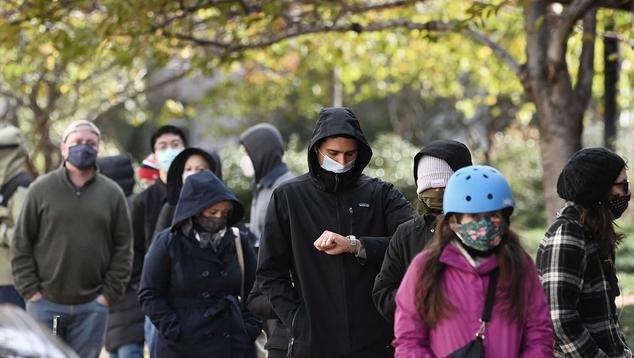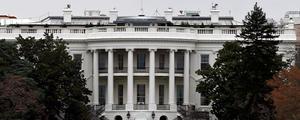Dear Elected Representatives:
I am the average American. I'm pretty dissatisfied with the way things are going in the United States today, and when pressed would tell you that one of the major reasons -- in addition to the ongoing crisis with the pandemic and the economy -- is the way our government works.
Looking back, I was most satisfied when I thought the economy was doing well -- in the mid-1980s and in the late 1990s -- and following big-impact international events, like after the Gulf War in 1991 and after 9/11. I was most dissatisfied in 1979, in 1992 and in 2008, all times when the economy was not doing well at all. Now I'm dissatisfied for a wider range of reasons.
Clearly, COVID-19 is the biggest issue on my mind. I'm wearing a mask and trying to adhere to social distancing protocols. I'm not at all satisfied with the way the federal government has handled the crisis, and I believe the government is making the situation worse rather than better. I'm much more likely to be positive about local responses to the pandemic -- including my state governor, but in particular my local government. I have mixed views of the job being done by the CDC. I'm now more willing than a couple months ago to get a COVID-19 vaccine if the FDA approves it and it's available at no cost. I do want the U.S. government to pass additional stimulus plans to help with the economic ravages of the pandemic. I'm worried that my children are falling behind in their education because of the constraints produced by the virus.
My confidence in the U.S. economy is a little stronger now than after the pandemic began last spring, but nowhere near as high as it was just a year ago. I'm still convinced that the economy is getting worse, not better. I'm not nearly as likely to believe that the economy is the nation's top problem as I have been in the past because the economic problems we're facing seem to be symptoms of the pandemic, our country's biggest problem. Still, I am worried about unemployment and don't think now is a good time to find a quality job.
I think the key to improving the economy is creating jobs, and I applaud any effort the government can make to bring manufacturing jobs back to the U.S. Creating more jobs is, in fact, the first thing I think of when I'm asked how to improve the economy. I am aware that artificial intelligence and advances in technology will eliminate many jobs in the future, but so far I am not worried that it's going to affect my job personally. I am not a union member, but I approve of labor unions in general.
I am not eager to dismantle the trade deals we have with other countries. I don't pretend to understand how the complex U.S. policies of trade and tariffs affect me personally, but in general I think foreign trade provides more economic opportunity than it costs. I tilt toward thinking that tariffs with China have hurt me more than helped me. I continue to think the U.S. has a major role to play in world affairs but that we don't have to take the leading role.
I'm more worried than I have been in a long time about the possibility that I will be laid off in this virus environment, or that my benefits will be cut. Still, I'm pretty satisfied with my own job, although I certainly tend to think that I should make more money and get better benefits. I have become more worried about the value of my home.
I do continue to believe that if one works hard and plays by the rules, the American dream is still achievable, and I tend to think that today's youth will have better lives than their parents. I'm generally satisfied with the way my personal life is going, at least before the virus hit. My daily enjoyment in life has fallen, and I worry more and experience more stress. I am going to cut back on my spending this Christmas season. I'm also more inclined in this economic environment to want to save rather than go out and spend.
Regardless of who is in power, I'm basically dissatisfied with the way the nation is being governed. To be specific, one of my main concerns, and something I've become increasingly concerned about in recent years, is how both Congress and the presidency don't seem to cooperate and compromise. I certainly don't approve of the job Congress is doing, and my confidence in Congress as an institution is lower than any other economic or societal institution in the U.S. today. I believe the men and women we elect and send off to Washington are more interested in their personal advancement than our interests. I believe many are corrupt. I put the ethics of members of Congress down there with car salesmen and lobbyists. I certainly think members of Congress are so focused on their rigid underlying ideologies that they've lost sight of their bigger purpose.
I have higher confidence in the president than in Congress and am generally positive about the Supreme Court. What I would like is for my elected representatives to figure out how to use their role to get things done rather than to obstruct or stick to rigid principles. As far as elections are concerned, I tend to support the idea of getting rid of the Electoral College and letting presidents be elected by the popular vote.
Elected leaders need to figure out how to balance the use of government so that it is not too much and not too little. I don't necessarily support draconian cuts in federal budgets and spending. That's because I tend to think that government has a role to play in addressing our country's problems. On the other hand, I think there is a lot that can be done by businesses and individuals to address our problems, rather than by the government. I'm sensitive to needing a balanced budget, but I'm also sensitive to the things the government needs to do to keep our society running. I look to the president and Congress to compromise more to reach decisions on how to tackle these competing interests rather than sticking to principles at all costs.
I am really, really anxious for the government to spend money to help offset the fallout caused by this virus. I know this may affect the deficit, but the deficit is not my priority right now. The virus is basically my highest priority today, along with focusing on the way government itself works. I would also like the government to address the nation's infrastructure problems even if it costs trillions.
I'm still not particularly happy about the tax cut legislation signed into law in 2017, and I don't see that the tax cuts have helped my personal financial situation. I'm not convinced that cutting taxes for big corporations or rich people, groups that I think pay too little in taxes to begin with, will trickle down and help me. I don't favor raising the estate tax, even for those with lots of money when they die. That doesn't mean, however, that I want to get rid of rich people; I don't. I actually think that having a rich class can be beneficial for the nation. When I was young, I wanted to be rich myself.
I am still quite interested in national politics and still get news and information from many sources. To be honest, I'm not sure what is meant by "the media," but I distrust it in general. I have lost faith in the media's ability to report the news fairly and accurately. I think most news reports, particularly those on social media, are biased -- and often inaccurate. Despite that, I more and more tend to get my news from social media feeds. I can find media sources that I like because they fit my own personal beliefs and ideologies, but the fact that I have to seek out specific sources makes me lose faith in the general coverage of our nation's news.
At the moment, I enjoy staying home with my family at night more than any other activity. I still like to watch television at night and enjoy relaxing, reading, getting outdoors and sewing. I also continue to like the idea of having children.
I have lost faith in many of our culture's institutions in recent years -- although in the midst of the pandemic, my confidence in some institutions, including the medical system, has gone up. I am less likely than I was in the past to go to church or identify with an official religion. Part of that reflects the fact that I have less confidence in religion as an institution, and I certainly have less faith now in the honesty and ethics of members of the clergy. But I have not lost my spirituality.
I retain faith in our military, mainly because I believe it is professional and competent. I think those serving in the military are motivated not by personal greed but by trying to help the national good, and I recognize that members of the military forgo personal rewards to act courageously to get things done on our behalf. These are traits that I do not see in our elected representatives -- and traits elected representatives could do well to emulate. In the economic sphere, I really admire industries that are involved with providing goods and services effectively and efficiently, including farmers, restaurants and grocery stores. I also admire the computer industry for the same reasons. The federal government has something to learn from these industries. I am at the same time particularly negative on big pharmaceutical companies and the healthcare industry. I do, however, have respect for individual medical professionals, particularly nurses. I have lost some confidence in the police.
I really like the free enterprise system in our country, and I'm much more positive about capitalism than about socialism. I also admire small businesses and have as much confidence in small business as any other institution in the country today. At the same time, I have little confidence in big business and believe that corporations are not paying enough in taxes. I believe that big-business CEOs are overpaid, and I'm skeptical of their honesty and ethics, but I'm not sure the government should step in and require higher taxes on CEOs' salaries.
I am increasingly dissatisfied with the quality of the environment in our country. I have grown more confident in our energy supply in recent years, and as a result I would give priority to the environment over increased energy production. I would also give priority to the environment over efforts to develop traditional sources of energy like oil, gas and coal. I strongly favor doing things to increase wind, solar and other alternative energy sources. Global warming continues to be a significant concern, although it's not extremely high as a personal worry of mine at this point. I'm not sure that global warming will pose a serious threat to me in my lifetime. I am not concerned about the future of the traditional fossil fuel industry and don't want the government to help those industries out. In fact, I have a more negative image of the oil and gas industry than other business and industry sectors that I'm asked about.
I continue to be somewhat more positive than negative about the Affordable Care Act. I think the government should help ensure that all Americans have healthcare, but I'm not so sure the government should actually be in charge of running the healthcare system. Still, off the top of my head, I tend to respond favorably to the idea of a national health plan like "Medicare for All," but my support varies depending on the details of just how such a plan would work. In general, I'm open to suggestions on what to do to fix our health system. Whatever healthcare plan we end up with, I think it's important that it retain coverage for those with preexisting conditions.
I like the idea of making sure that all of our young kids get quality pre-K education. I like the idea of free community college and, in fact, favor making all public colleges free. I think spending more government money to improve schools is money well spent. I tend to think my child is getting a good education, but have my doubts about the quality of education nationwide. I am concerned about children falling behind if their schools are closed due to the pandemic.
I do not favor letting immigrants come into the country illegally. I'm all for stopping illegal immigration, including increased border security and more border patrol agents, if necessary. But I don't favor building a wall between the U.S. and Mexico, whoever ends up paying for it. I think legal immigration in general is good for our country, and I don't want to decrease legal immigration. I don't favor banning Muslims from coming into the country. I like the idea of employers having to use an E-Verify system. I tend to favor a plan that would deal with illegal immigrants already in this country in some way that allows them to stay here in the long run if they meet certain qualifications. I favor a plan to allow children who were brought into this country illegally to have a pathway to citizenship.
Terrorism is a lingering concern, although I am pretty satisfied at this point about our nation's security from terrorism, and I'm not highly worried that I will be the victim of a terror attack. I tend to think that our military spending and the strength of our military is about right. I believe it's important that the U.S. be No. 1 in the world militarily, and I overwhelmingly favor efforts to help veterans who have already served their country.
I favor almost any proposal that people have made to prevent guns from getting into the wrong hands, including universal background checks, mandatory registration and even a 30-day waiting period to be able to buy a gun. I don't, however, favor banning guns.
I tend to accept the fact that the nation's moral values are changing. I rate morality in this nation very low, and think that our moral values are getting worse, not better. At the same time, I am much more likely now than I used to be to say that same-sex marriage is OK and to accept the legalization of marijuana. I'm less disapproving of sexual relationships outside the bonds of traditional marriage. I am even a little more likely to say that polygamy is morally acceptable. I'm conflicted on abortion but generally favor efforts to restrict its use. However, I do not support banning abortion altogether, and I do not want Roe v. Wade overturned.
I am increasingly concerned about race relations and racial inequity. I support the Black Lives Matter movement, but I'm conflicted on whether racial justice protests have a positive effect. I'm not sure what the government should be doing about racial inequity. I favor police reforms, but not defunding; I favor better educational opportunities for minorities, but not busing; I favor increased economic opportunity and the concept of affirmative action, but not quotas or explicit taking of race into account in making hiring and promotion decisions. I do not favor the concept of reparations that attempt to provide recompense to Black Americans who are the descendants of slaves.
Overall, I recognize that we live in a time of change, and if I could talk to politicians in person, I would ask first how they are going to get Congress and the rest of government to work cooperatively to address that change. I pay pretty close attention to national politics and am not simplistic when it comes to government and its role. I certainly believe that the government has its place in society -- and amid the pandemic, I am more likely than usual to say that government should make a greater effort to address the nation's problems and look for solutions. I am not in favor of simplistic plans to just cut government indiscriminately, but would seek thoughtful discussion on what the role of government should be in our society, how it can be most fruitfully used, what the costs and benefits are of government intervention in various aspects of our society, and how we are going to pay for it. That's what I believe we elected you to do.
Thank you for this opportunity to talk with you.
Sincerely,
The Average American




